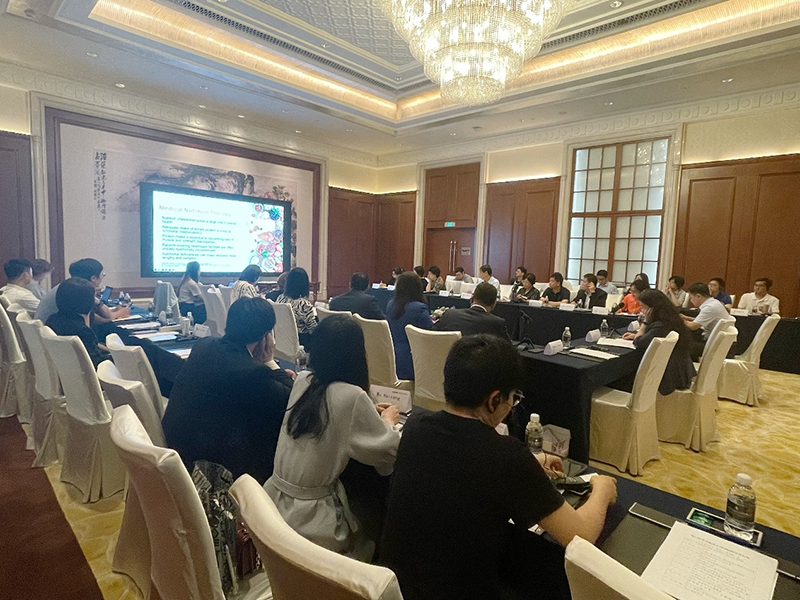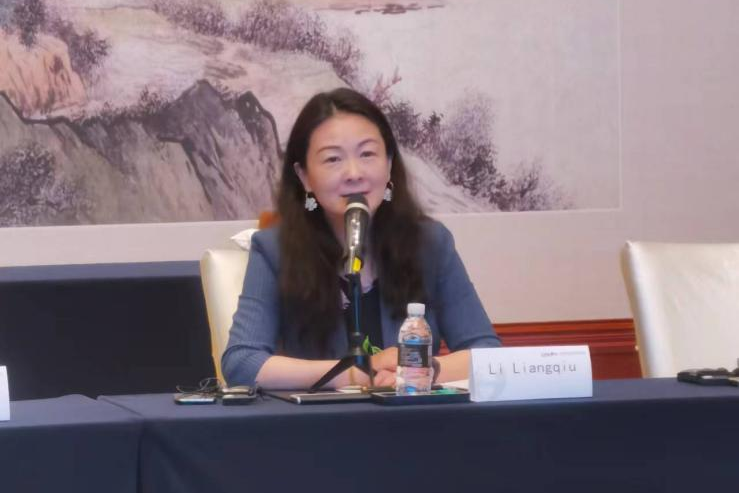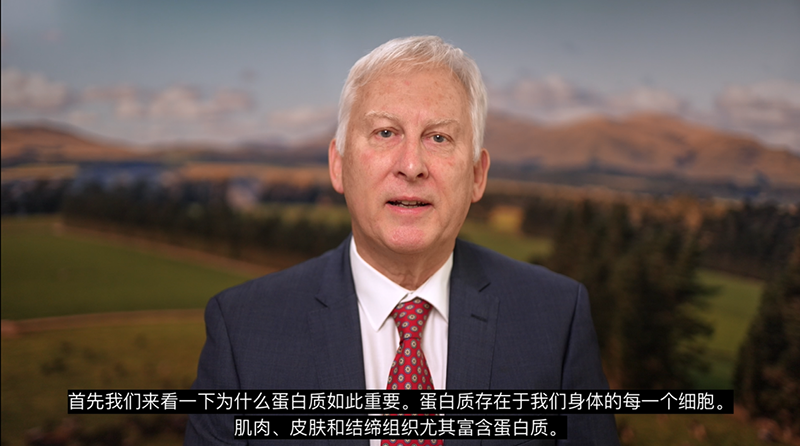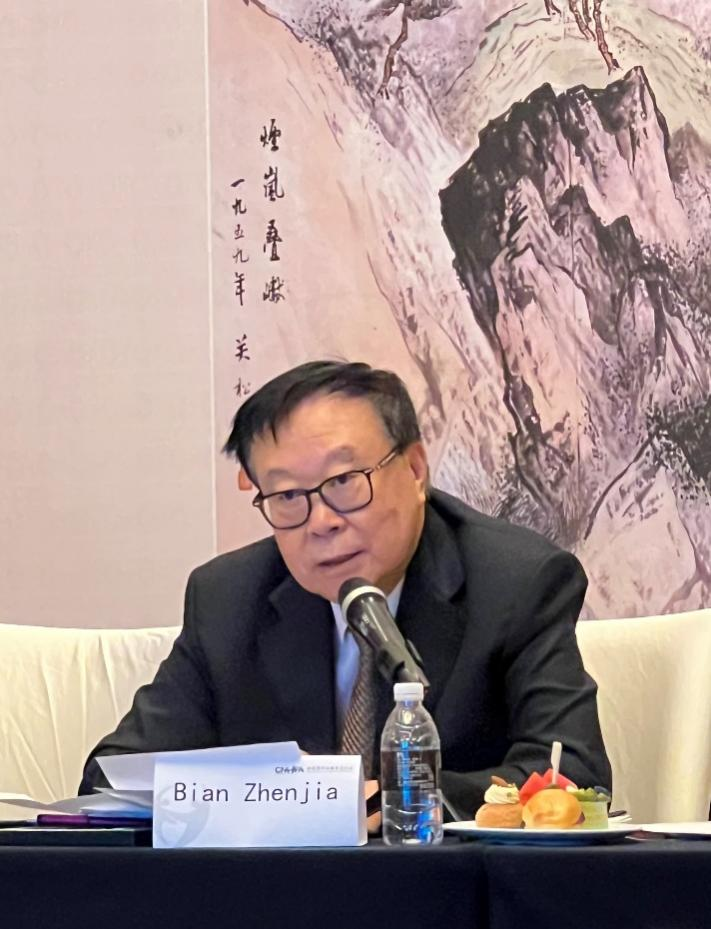On June 20th, the CNHFA organized an International Symposium on Protein Research and Clinical Applications in Shanghai. The meeting was hosted by Li Liangqiu, Executive Vice President of the CNHFA. The attendees included Li Xiaokun, an academician of the Chinese Academy of Engineering; Bian Zhenjia, President of the CNHFA; Li Yulin, Deputy Director of the Infant Formula Review Department at the Food Review Center, State Administration for Market Regulation (SAMR); Zhang Hongyu, a professor at the School of Pharmacy, Wenzhou Medical University; Cai Meiqin, a professor at Shanghai Jiaotong University; Wang Haihong, Deputy Director of the Infection Control department at Wenzhou People's Hospital; Wang Youfa, a professor at Xi'an Jiaotong University; Associate Professor Zhong Jian, Dr. Ruan Huijuan, and Dr. Wang Yun at Xinhua Hospital, affiliated with Shanghai Jiaotong University School of Medicine; Karen Sudders, a nutrition expert from Medtrition; Dr. Flavia Fayet-Moore, the founder and CEO of Nutrition Research Australia; and Dr. Stephen Robinson, a professor at RMIT University.


International experts from the USA and Australia shared their perspectives on recent research advancements and clinical applications of protein products. Karen Sudders delivered a presentation on the utilization of liquid protein. She emphasized the significant role of nutritional interventions in overall health based on research findings. Additionally, she highlighted that liquid protein products facilitate a better connection between protein formulation and availability.

Dr. Flavia Fayet-Moore, the founder and CEO of Nutrition Research Australia, delivered a presentation titled "Nutritional needs, requirements, and deficiencies across the life cycle: insights from Australia and implications for Chinese consumers." In her presentation, she outlined the establishment of nutritional standards through a comprehensive 7-step process. These steps involve identifying target populations, assessing major health concerns, determining key nutrients, prioritizing nutrient importance, examining nutrient interactions, optimizing dosing, and summarizing key findings. This rigorous process aims to ascertain nutritional needs throughout different life stages and develop standards with a global impact.

Dr. Stephen Robinson, a professor at RMIT University, delivered a presentation on the role of dairy products in addressing protein deficiency. He provided a comprehensive overview of the significance of protein, the causes and impacts of protein deficiency, common symptoms associated with protein deficiency, and how dairy products can be utilized to treat this condition. He referenced studies demonstrating that milk consumption can effectively reverse protein deficiencies in malnourished populations, leading to a significant reduction in the proportion of children experiencing severe malnutrition from 25% to 5% after implementing appropriate measures.

Andrew Clarke, PhD in Biochemistry and Molecular Biology at the University of Auckland, presented a review of recent research highlighting the role of A2 beta-casein in digestive function, cognitive processing, and antioxidant activity. Multiple studies conducted in recent years have consistently demonstrated the benefits of A2 beta-casein, including improved tolerance to dairy products and alleviation of digestive symptoms. Moreover, children consuming A2 beta-casein exclusively have shown enhanced performance in applied cognitive analysis tests. Recent research has also focused on glutathione (GSH), a vital antioxidant that supports metabolic function and provides protection against cellular damage. Findings indicate that while traditional milk increases cellular glutathione levels, milk containing only A2 beta-casein can further elevate the levels of this antioxidant by more than 50%.

During the discussion session, participants engaged in an insightful exchange of views on various topics including the development and application of Food for Special Medical Purposes (FSMP), different types and optimal dosages of protein, comparative studies on protein sources, nutritional requirements for pregnant women, and challenges encountered in the clinical application of FSMP.
Li Xiaokun, an academician of the Chinese Academy of Engineering and president of Wenzhou Medical University, delivered an insightful keynote speech on the "Wenzhou Health Ecosystem." The speech encompassed a discussion of various aspects, including the research team's accomplishments and recent advancements in protein research, the establishment of a robust talent training system at Wenzhou Medical University, and the advantages and feasibility of locating special medical food industry projects in Zhejiang Province, with a particular emphasis on Wenzhou.

In his concluding remarks, Bian Zhenjia, President of the CNHFA, provided an insightful overview of the diverse demand for various types of FSMP in China, supported by detailed data. He further discussed the current development of the FSMP industry in the country, highlighting the approval process for relevant products. Additionally, he shed light on the favorable conditions conducive to the industry's growth in China, including government policies, robust scientific research support from academician teams, market demand, and the pivotal role of industry organizations as facilitators.
After this event, the CNHFA will give full play to its role as a platform and continue to organize relevant international exchange activities to promote the sustainable and healthy development of the industry.


